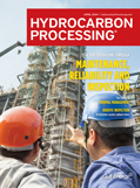Haldor Topsoe joins research program to improve catalysts
Haldor Topsoe is part of ProNOx – a new four-year, $4-MM research program to improve selective catalytic reduction (SCR) catalysts by designing an optimal nanomaterial.
By optimizing titanium dioxide nanoparticles, researchers aim to improve the efficiency of catalysts used for cleaning off-gases from engines, industry, and power plants by 30%. This will significantly enhance companies’ ability to meet strict environmental regulations.
The most effective catalyst for removing toxic nitrogen oxides (NOx) consist of titanium oxide crystals covered with highly dispersed vanadium oxides.
“Clean air is increasingly important to people in megacities across the globe, and companies need to stay in compliance with increasingly strict environmental regulations. The ProNOx program brings together three world-leading research teams to further optimize the best solution, we have available today – and I believe that we can improve catalytic emissions control significantly,” said Kurt Agerbæk Christensen, senior general manager, Haldor Topsoe.
SCR catalysts remove NOx from flue gases from engines, boilers and other industrial combustion. NOx causes smog, acid rain, and forms a wide variety of toxic products when it is released into the atmosphere.
The program will utilize the most recent research on how to control materials synthesis at the atomic scale by closely integrating synthesis, characterization, modeling and tests. The end-goal is to identify the optimal SCR catalysts and how to produce it in a controlled way.
The ProNOx program is a collaboration between Haldor Topsoe and two research teams at Aarhus University, one team from the chemistry department led by Professor Bo Brummerstedt Iversen and the other team from the Interdisciplinary Nanoscience Center (iNANO) led by Associate Professor Jeppe V. Lauritsen. Innovation Fund Denmark invests approximately $2.8 MM in the project.






Comments